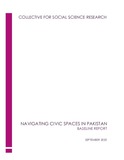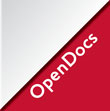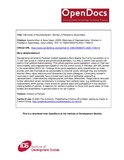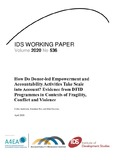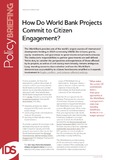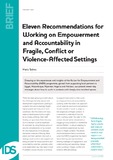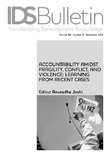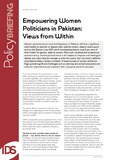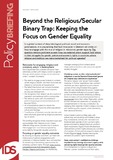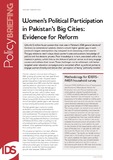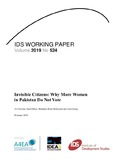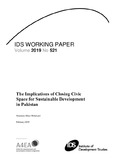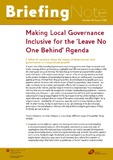Pakistan - Governance
Browse by
Recent Submissions
-
Violence and Discrimination against Women of Religious Minority Backgrounds in Pakistan
(Institute of Development Studies, 2020-11)The theme of this special collection of papers, the lived experiences of women who belong to religious minorities, has been a blind spot both in international development policy engagement and in much of the international ... -
Navigating Civic Spaces in Pakistan
(Collective for Social Science Research, 2020-09)This background paper is a review of changing civic spaces in Pakistan during the brief period from July 2018, when national elections brought a new government to power, until the first lockdowns due to the Covid-19 pandemic ... -
Winning or Buying Hearts and Minds? Cash Transfers and Political Attitudes in Pakistan
(UNU-WIDER, 2019)This paper studies how household-level receipts of cash transfers affect political attitudes in Pakistan. The paper exploits the locally exogenous eligibility cut-off of the flagship Benazir Income Support Programme to ... -
Women Politicians Navigating the ‘Hostile Environment’ in Pakistan
(Institute of Development Studies, 2020-09-21)Women in Pakistan operate within highly patriarchal contexts that promote their exclusion from public spaces; but those working in politics, the most public of spaces, defy these prevailing gender norms. This article ... -
Invisible Targets of Hatred: Socioeconomically Excluded Women from Religious Minority Backgrounds
(Institute of Development Studies, 2020-09)This paper endeavours to make visible the targeting of poor women from religious minorities in contexts where society and/or the state both engage in religious ‘otherisation’. The paper seeks to contribute to addressing ... -
Dilemmas of Representation: Women in Pakistan’s Assemblies
(Taylor & Francis, 2020-05-05)Recognizing constraints Pakistani women legislators face despite their entry into politics on a 17 per cent quota in national and provincial assemblies, it is time to rethink how quotas can lead to their political ... -
How Do Donor-led Empowerment and Accountability Activities Take Scale into Account? Evidence from DFID Programmes in Contexts of Fragility, Conflict and Violence
(IDS, 2020-04-03)Development donors invest significantly in governance reform, including in contexts characterised by conflict and fragility. However, there is relatively little comparative study of their change strategies, and little ... -
How Do World Bank Projects Commit to Citizen Engagement?
(IDS, 2020-03-19)The World Bank provides one of the world’s largest sources of international development funding, in 2019 committing US$62.3bn in loans, grants, equity investments, and guarantees to governments and private businesses. The ... -
Eleven Recommendations for Working on Empowerment and Accountability in Fragile, Conflict or Violence-Affected Settings
(IDS, 2020-02-11)There has been growing concern about the challenges faced by donors and development organisations working in contexts that are increasingly fragile, highly volatile and insecure. In such conditions, the first instinct of ... -
Debating Empowerment: Men’s Views of Women’s Access to Work in Public Spaces in Pakistan-Administered Kashmir
(Taylor and Francis, 2019-11-06)In the aftermath of the 2005 earthquake that struck Pakistan-administered Kashmir an unprecedented number of development actors arrived in the region. Their impact influenced men’s perceptions of change in the gendered ... -
Empowerment and Accountability in Difficult Settings: What Are We Learning?
(IDS, 2019)Empowerment and accountability have long been part of the international development vocabulary and a core part of governance, social development and civil society programmes. Yet, much of what has been learnt about these ... -
Empowerment without Accountability? The Lawyers’ Movement in Pakistan and its Aftershocks
(Institute of Development Studies, 2019-09-27)This case study on the Pakistan Lawyers’ Movement and its aftermath aims to add to our knowledge of judicial empowerment processes, particularly the role of lawyers in mobilising for an independent judiciary, and the ... -
Empowering Women Politicians in Pakistan: Views from Within
(IDS, 2019-04-16)Women parliamentarians and local legislators in Pakistan still face a significant uphill battle to establish or deepen their political careers, despite recent gains such as the Election Law 2017 which mandated parties to ... -
How Does the World Bank Build Citizen Engagement Commitments into Project Design? Results from Pilot Assessments in Mozambique, Myanmar, Nigeria, and Pakistan
(IDS, 2019-04-08)How and to what degree is the World Bank putting its new institutional citizen engagement (CE) commitments into practice? This question guides an independent assessment that the Accountability Research Center (ARC) at ... -
Beyond the Religious/Secular Binary Trap: Keeping the Focus on Gender Equality
(IDS, 2019-03-19)In a global context of deep ideological, political, social and economic polarisations, it is unsurprising that fault lines exist in Western aid circles on how to engage with the role of religion in relation to gender ... -
Women’s Political Participation in Pakistan’s Big Cities: Evidence for Reform
(IDS, 2019-03-08)Why did 11 million fewer women than men vote in Pakistan’s 2018 general elections? Contrary to conventional wisdom, there is a much higher gender gap in each province’s largest metropolitan city compared to its remaining ... -
Invisible Citizens: Why More Women in Pakistan Do Not Vote
(IDS, 2019-02-20)Why does a gender gap in voting exist in Pakistan? Our research looks beyond the creation of democratic spaces for women's participation, such as voter registration, to look instead at the constraints that women face in ... -
The Implications of Closing Civic Space for Sustainable Development in Pakistan
(IDS, 2019-02-07)This paper presents findings from a case study exploring the prospects for measuring the impacts of restricted civic space on development in Pakistan. It is part of a larger inquiry into the phenomenon of restrictions on ... -
Women in Politics: Gaining Ground for Progressive Outcomes in Pakistan
(IDS, 2018-11)This paper is an analysis of findings from a study of women’s political voice in Pakistan under the A4EA Research Programme. It is based on mixed methods, drawing together archival and secondary sources, qualitative ... -
Making Local Governance Inclusive for the 'Leave No One Behind' Agenda
(Institute of Development Studies, 2018-08)A major aim of decentralised governance is to bring government closer to people and, in the process, deliver services in an equitable and efficient manner, in accordance with the expressed needs of citizens. The fact ...


